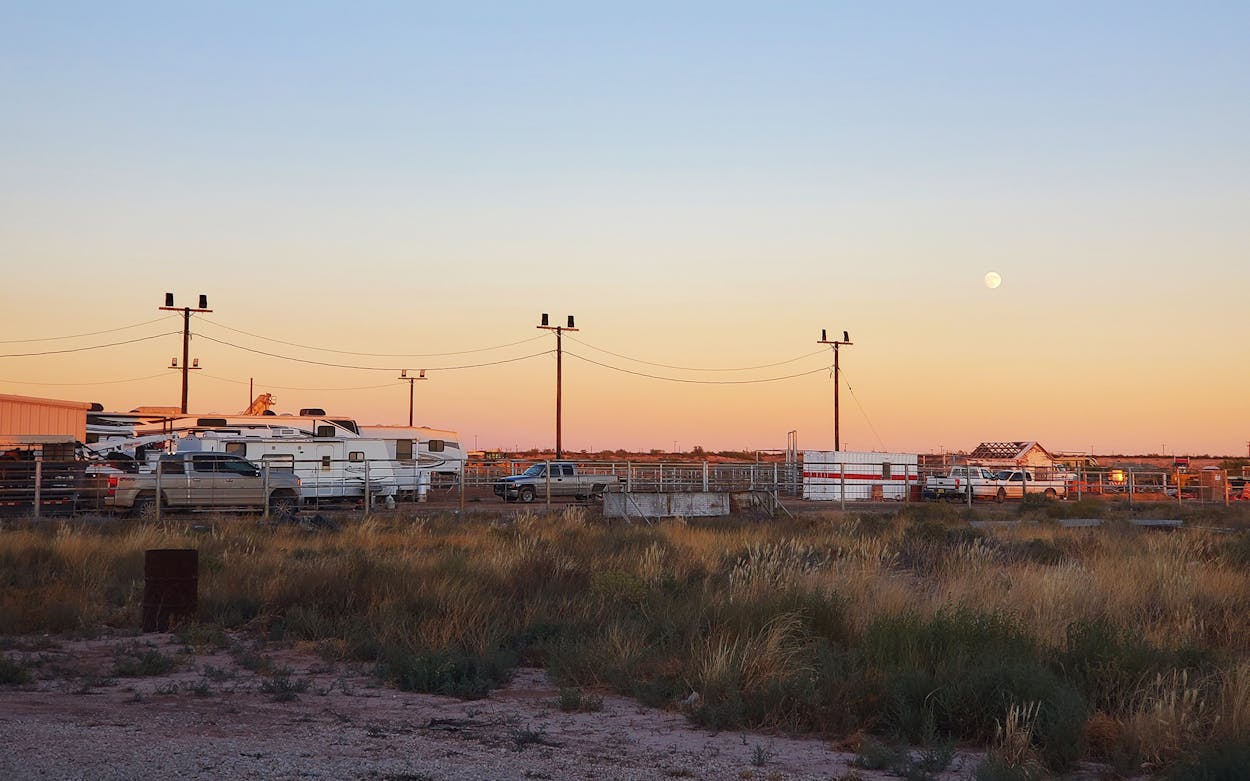Mentone, the only semblance of a town in Loving County, is mostly quiet in mid-afternoon. The silence is broken only by the intermittent screech of brakes from big rigs trying to will their heavy loads to a stop before making the 90-degree turn north onto County Road 300. They’re headed into the heart of nowhere. Soon they’ll turn off the asphalt onto an oil patch road, kicking up clouds of caliche dust toward a sky that’s as high as it is empty.
With 169 souls calling this parched West Texas frontier home, Loving County is the least populated county in the lower 48. You can take in all of Mentone from the porch of the post office; it takes longer to go through the checkout at H-E-B than it does to drive through the place. (Not that Mentone has an H-E-B, or any grocery store, for that matter. The nearest H-E-B is 75 miles away in Odessa.) If you happen to visit during a pandemic, when the town’s only men’s room is closed—and if you happen to need to attend to business that can’t be accomplished in a urinal—well, buddy, hope you can hold it till Orla. Loving is also the last county in the United States to have zero reported cases of COVID-19.
I visit Loving a few days before Halloween. It’s a little past noon on a Thursday, and county judge Skeet Lee Jones is holding court in the chow hall of the Target Logistics man camp just outside of Mentone, among its rows and rows of trailer homes rented by oil field companies to house their workers. When I ask Judge Jones about the pandemic, he lowers an onion ring and leans in across the table.
“Personally, I’m not scared,” Jones says. “But wearing the judge’s hat, I am extremely concerned, especially for the elderly and the ones that have preexisting conditions.” Despite his concern, the 69-year-old judge has avoided wielding the power of his office to enforce safety measures, opting instead to let the few local businesses and county department heads decide for themselves how to run their offices. “Me, in my office, I’m a little bit lax, which I probably shouldn’t be,” he admits. “But now over at the appraisal office, they take extreme precautions. Whenever somebody comes into the building, the staff wipes it down and they wear masks all the time.”
That no COVID cases have been attributed to Loving County doesn’t mean the virus hasn’t made an appearance. At least two folks contracted the coronavirus elsewhere and came back here to quarantine. The judge’s youngest son was one of them. After he tested positive in Dallas, he called his dad and asked if he could come home for the mandatory isolation period. He spent two weeks in a bunkhouse on Jones’s ranch “out with the rattlesnakes and coyotes” and ate dinner twenty feet away and downwind from everyone else on the porch.
The man camp is by far the biggest place where anyone gathers in Loving County. The camp’s manager seems to be taking the pandemic seriously: When residents leave, they must have their temperatures checked at the 24-hour security gate before they’re allowed back inside. Masks are required in public spaces unless you’re eating or drinking. If anyone runs a fever or feels ill, they’re immediately sent to the county’s only medical clinic, a private outpost run by Occupational Health and Safety International (OHSI). A few of the hands have tested positive there and were directed to go home to quarantine. They’re not allowed to return to their rooms, so their belongings are shipped back. And because they’re not residents of Loving County, their cases are counted wherever they live instead—keeping the county’s perfect goose egg intact, at least for now.
The camp is the modern iteration of the one that the Jones family lived in when they first moved to Loving County chasing an oil boom in the fifties.
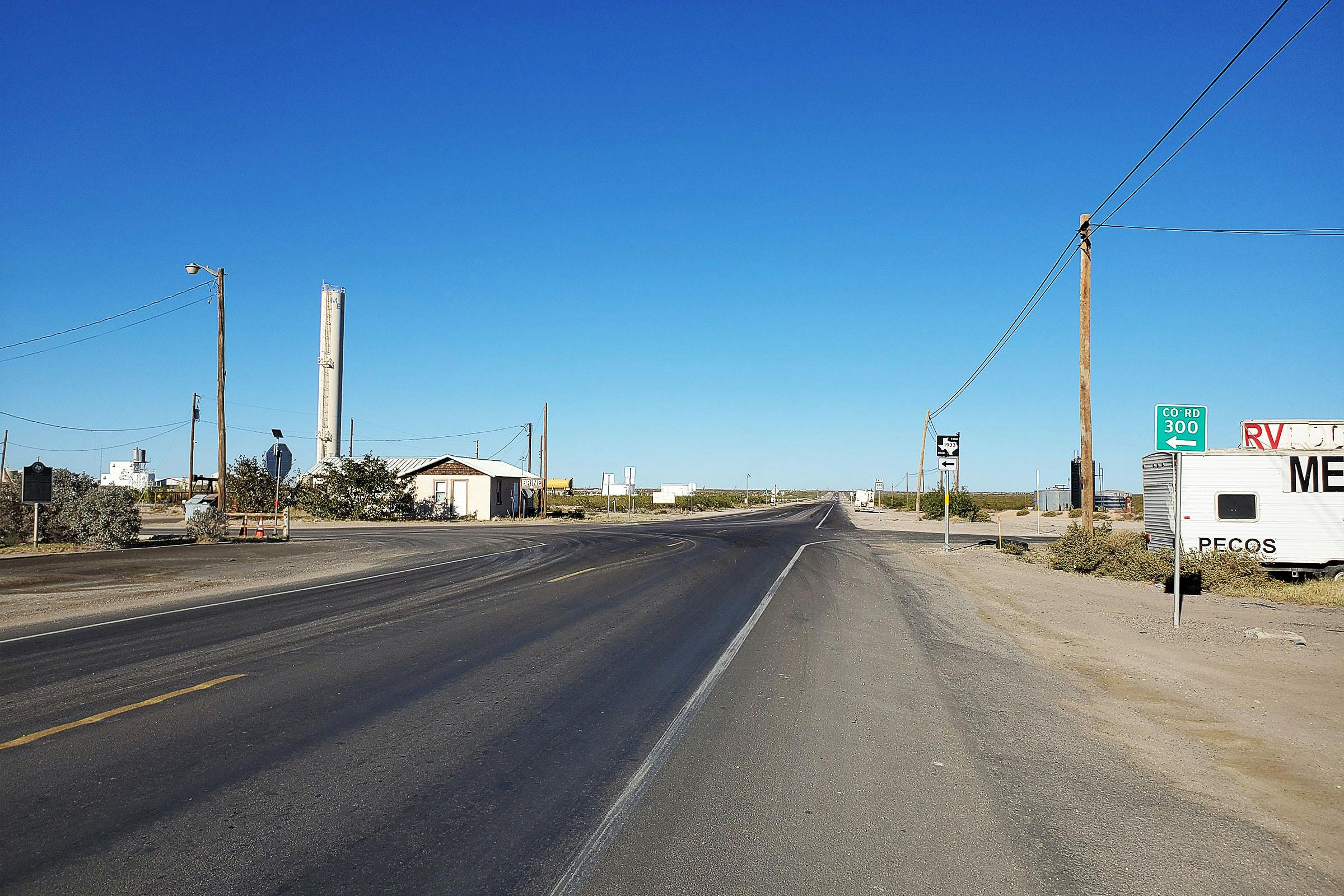
Back then there was no cafeteria with an Icee fountain and a soft-serve ice cream machine. The Jones home was a shotgun shack without air conditioning or indoor plumbing. The water that came up from their well was too brackish to use for washing clothes and barely lathered soap enough to bathe with. If you were dying for a sip of cool water, you had to haul it in from the town of Pecos, 25 miles to the south.
“You know, we had this epidemic hit and toilet paper disappeared off the shelves,” Jones says, flashing a toothpaste-commercial smile. “When I was a little kid, I didn’t know what toilet paper was. We always saved a newspaper and it went to the outhouse. It’s what’s called ‘recycling.’”
You don’t have to haul in water today. In 2007, Jones, a county commissioner at the time, worked with other local officials to open the first public water system for Loving County—his mother wept tears of joy the first time she turned on her tap. Paving the caliche roads took several more years and a contentious tax bond or two, but slowly the dusty roadways were tamed into beautiful blacktop. The county’s timing was good: The first rumbling of the shale boom felt here, in 2008, would eventually crescendo in the biggest oil boom in state history.
Since then hundreds of millions of tax dollars have been pumped straight from the oil field into county coffers. Over the last few years, the sheriff’s department has grown from one deputy to nine. There’s an ambulance service now for the first time in county history, and a brand-new playground and tennis court sit next to the long-empty school. For a rural community with 25 oil or gas wells to every one human, the county officials ain’t doing too bad, either. Most of the elected officials, including the clerk, the constable, and the judge, draw an annual salary of $102,947.22. Those three also have something else in common: they’re all Joneses.
“My nephew’s a constable. My sister’s the district/county clerk. My brother is a commissioner. My cousin is head of the road department,” Judge Jones says. “You can’t throw a cat out of a window unless you hit a Jones.”
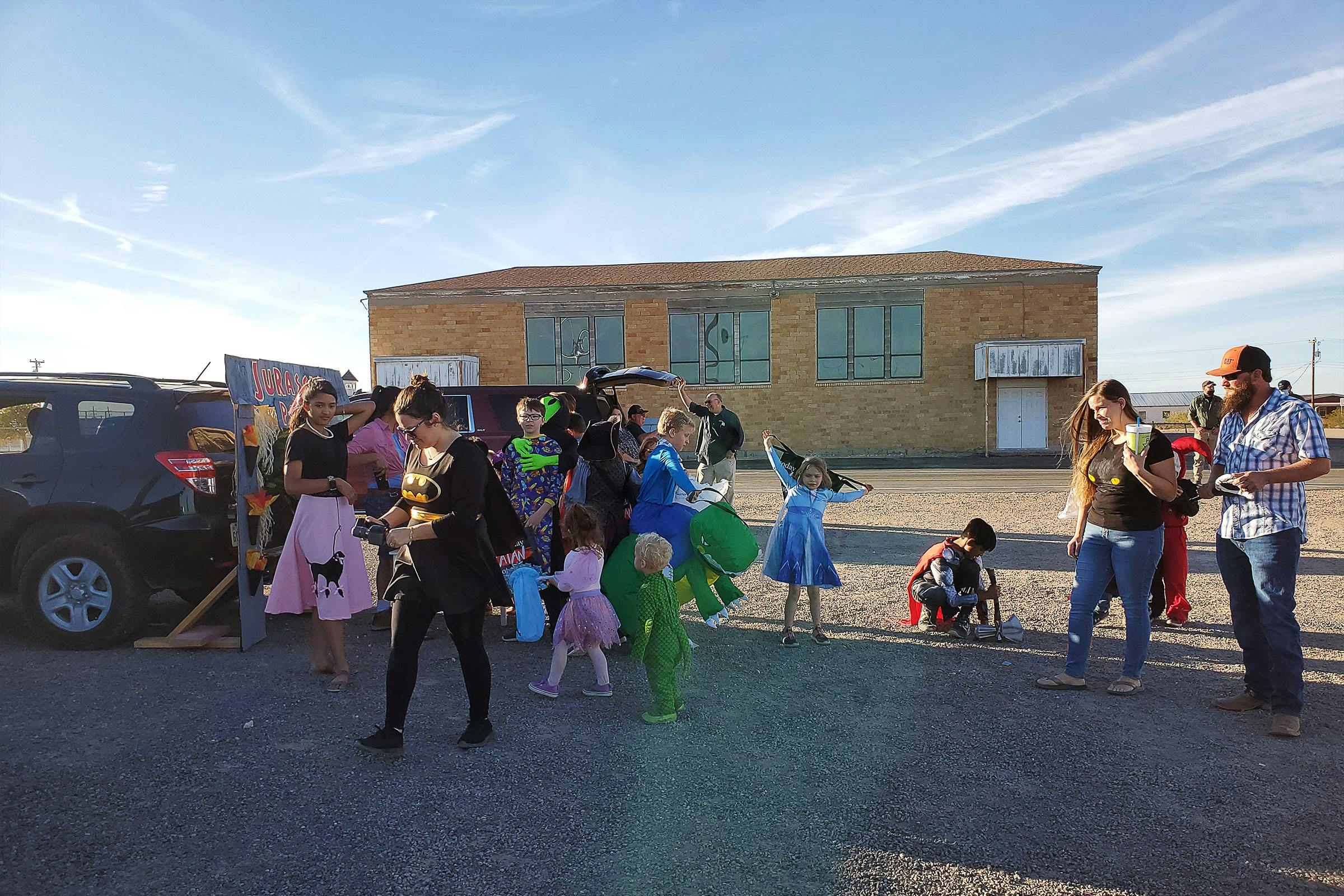
At lunch, we run into Jones’s oldest son, Matthew, as we come in the front door. After we pick up our food from the front, cafeteria-style, the three of us sit down, a few chairs between us, at a large circular table. As we plow into plates of barbecue chicken, the judge’s nephew, Constable Brandon Jones, strolls in, his firearm tucked in its holster on his side. The constable’s family files in behind him. Ivy Jones, the judge’s teenage great-niece, stops by our table to say hello.
She asks if we heard what happened at Punk’s the day before. The “Punk” she’s referring to is Punk Jones, the judge’s 93-year-old father, a famous lawman in these parts, who served as the sheriff of Loving County from 1965-1992. What had happened at Punk’s was the tires on his trailer had gone missing, so he went to the sheriff’s office and reported them stolen. The deputies came out to his place, took pictures, and started a case. This morning, when Ivy and her dad popped into the sheriff’s office for a visit, a deputy asked, “Do y’all know about the tires that got stolen off your grandpa’s trailer?” “What?” Ivy says, “That was Montana!” Her brother and a ranch hand had taken the tires off the day before because they were long past being roadworthy. “Well,” the deputy sighed, “that solves that case.”
Judge Jones cracks up at this. His laugh is hearty and comes easily. He’s built like an oil drum, with salt creeping into his pepper hair at his sideburns. He looks a bit like the actor Ernest Borgnine; he tends to idly run a finger down his nose. His crisp blue gingham shirt is tucked into dark blue jeans, and his red ostrich boots have seen a lot of miles. I assume from experience that he’s carrying a weapon, but the only thing he’s noticeably armed with is a pen and mechanical pencil tucked into his shirt pocket. If the pandemic is weighing on him, he doesn’t show it.
“This COVID is serious business,” Judge Jones emphasizes. But, as holds true for much of West Texas, he’s not greatly rearranging his life to reduce the possibility of exposure. His dad, Punk, isn’t either. The nonagenarian practices social distancing, wears a mask, and is mostly isolated through the sheer remoteness of his location, but he still makes trips to the post office. “In other words,” the judge says, “he’s not going to lock himself up in the closet and turn off a light.”
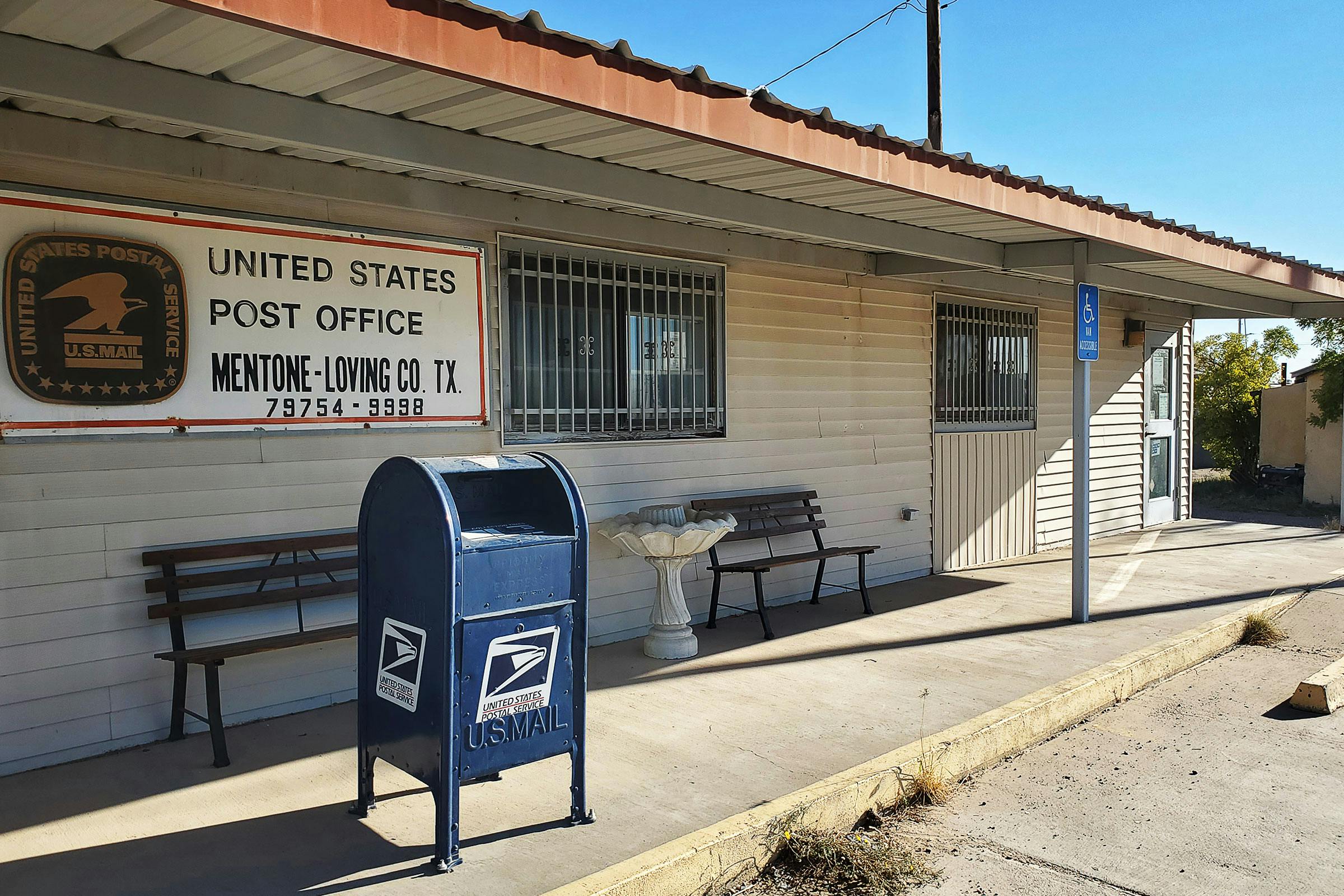
That evening, I stop by the OHSI clinic about a mile southwest of Mentone. The paramedics who work here in two-week hitches are the only medical personnel for miles. They’re Loving County’s best line of defense against the virus. “You’ve got to be the cavalry,” Cary Skelton, the clinic’s director tells me. The military vet looks like an off-duty soldier: he’s wearing tactical pants and a grey OHSI t-shirt with an American flag patch on the sleeve. His shotgun, Bubba, is resting against an ambulance. He brought it to protect Tigger, the crew’s cat, who’s sitting on the ambulance hood. The coyotes have been getting too close for comfort. “You’ve got to be your own support,” he says. “No one’s going to come help.”
The following day, I duck into the sole purveyor of goods and gasoline in Loving County, the Horseshoe Convenience Store. Built three years ago, the Horseshoe sits on the site of what was once Keen’s Cafe, whose regionally famous proprietor, Newt Keen, was known for telling jokes with a toothless lisp he acquired after a drifter shot him in the mouth. (At least that’s how one version of the story goes.)
The Horseshoe is open 24/7 and is the only place to grab ice, beer, beef jerky, and all other manner of roughneck essentials. I head inside to grab some water. Pop country booms over speakers and women in Budweiser bikinis smile from cardboard cutouts on the walls. A fortress of BlueDEF (diesel exhaust fluid) boxes surround the hot food cases, where foil-wrapped burritos and burgers sweat under heat lamps. Most of the men inside look like freshly plucked chickens, their faces raw and burnt from the wind and sun. Almost no one wears a mask, including the two friendly clerks who are both in costume for Halloween.
The younger clerk is dressed as comic book character Harley Quinn; Anita, who has a few decades on Harley Quinn, is dressed as a pirate. She steps out into the parking lot for a smoke. “The guys from the [health] clinic come in here every day,” she says, “They’re always getting on to me for not wearing a mask. But I rub sanitizer on my hands all day.” Anita shows me her hands. They’re chapped. “L-O-V-E” is tattooed in fading ink on her left hand knuckles.
Across the street, Tayce Tye is seated at one of the plastic picnic tables outside of the courthouse. She’s waiting with her two-year-old, Holden, for the bus to drop off her kindergartner. We talk as the wind whips her blond hair around her face. The yellow eyes of a cat glare from her black T-shirt. She’s lived here since Holden was born. Her husband works for a company that does the earthworks and utilities for the man camps. They live in a trailer behind the camp that’s currently closed. The Tyes moved here from Houston, and part of the draw, she says, is the lack of drama. “You don’t have to watch your P’s and Q’s like when you go to the cities,” she says. “When we go home to visit, there are so many mandates and stuff, but out here it’s just whatever.”
Five days before the election, Tye is more concerned about what will happen if Joe Biden wins than she is about COVID. Like many in the area, she thinks a Biden presidency will be hell for the region’s economy. (Of the 66 votes cast in the presidential election, 4 of them were for Biden, while 60 went to Donald Trump and 2 to Libertarian Jo Jorgensen.)
The bus pulls up and a mash-up of miniature monsters, angels, scarecrows, and superheroes spills through the doors. A pint-sized ninja walks up to Tayce. “You’re already eating candy?” she asks. He smiles and empties the rest of the box of Milk Duds into his mouth. It’s a simple but good life for the kids, Tayce says. “The kids watch the bobcats that are down there at the camps,” she says. “Last year they had a litter of three and this year they had a litter of two. The coyotes come pretty close. They get to see a lot of wildlife.”
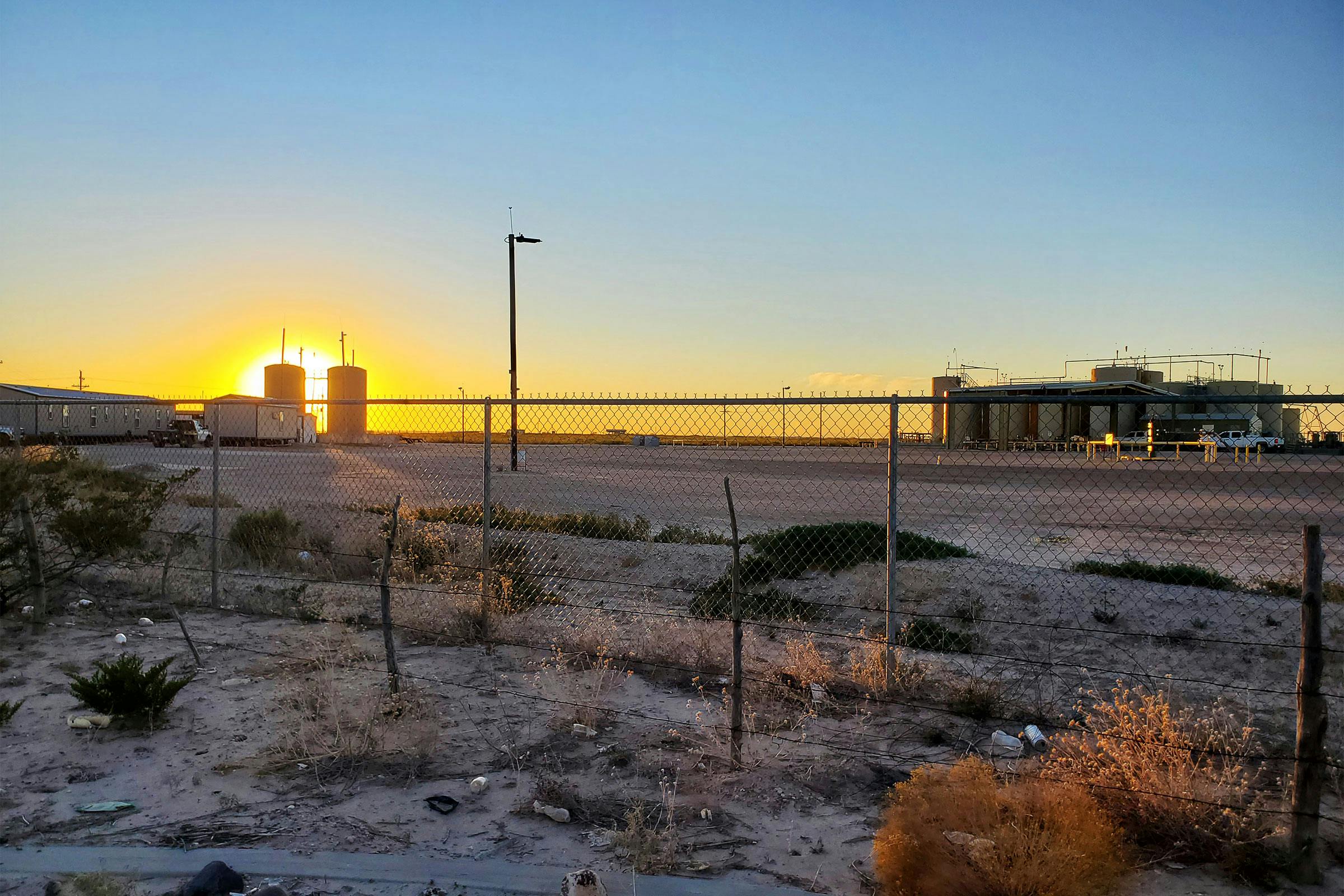
A few hours later, as the sun is setting, the same costumed kids that had been on the bus congregate for the “trunk or treat” party being held in the parking lot of the old school. Cars and trucks are backed into a circle, their trunks raised or tailgates put down to display small mountains of candy. One car is decked out in a Jurassic Park theme, a toy T-rex prowling over a cardboard candy bowl. The movie’s theme drifts out in the open air, mixing with the sound of spurs jingling on the boots of a ranching couple walking around with their daughter, who’s dressed as Jessie the cowgirl from Toy Story.
Judge Jones is here with his wife, doling out candy to the kids from the bed of his pickup. Their son, Matthew, shows up a little later with his family, toting his three-month-old daughter in a cradle. The judge takes a break from his candy duties to coo over the baby. Behind them, the nearly full moon rises like a huge scoop of butter on the horizon.
This little gathering is one of the few annual occasions when the community comes together. Even in 2020, when more than a million cases have been reported across Texas, about a third of the county’s population has shown up. Ranchers chew on the latest gossip with county commissioners. Kids and grandmas hug. The two dozen or so kids trunk-or-treating make the rounds until their bags are overflowing. No one seems too concerned about the rising numbers elsewhere in the state. At least one kid is wearing a mask, though. He’s come as a black-beaked plague doctor.
- More About:
- Health
- Pandemic
- West Texas


